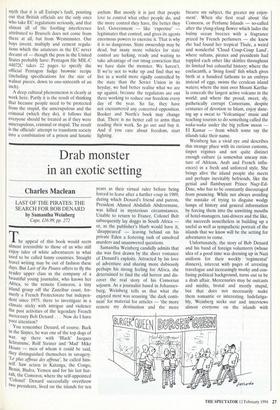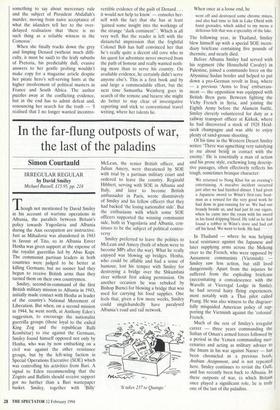Drab monster in an exotic setting
Charles Maclean
LAST OF THE PIRATES: THE SEARCH FOR BOB DENARD by Samantha Weinberg Cape, £16.99, pp. 272 The appeal of this book would seem almost irresistible to those of us who still enjoy tales of white adventurers in what used to be called funny countries. Straight travel writing may be out of fashion these days. But Last of the Pirates offers to fly the reader upper class in the company of a beautiful young journalist, who knows her Africa, to the remote Comoros, a tiny Island group off the Zanzibar coast, for- merly a French Protectorate but indepen- dent since 1975, there to investigate in a climate sticky with intrigue and violence the past activities of the legendary French mercenary Bob Denard ... Now do I have your attention?
. You remember Denard, of course. Back In the Sixties, he was one of the top dogs of war, up there with `Black' Jacques Schramme, Rolf Steiner and `Mad' Mike Hoare — men of whom it could be said, they distinguished themselves in savagery. Le plus affreux des affreux', he called him- self. Saw action in Katanga, the Congo, Benin, Biafra, Yemen and for his last hur- rah, the Comoros, where the self-appointed Colonel' Denard successfully overthrew two presidents, lived on the islands for ten years as their virtual ruler before being forced to leave after a further coup in 1989, during which Denard's friend and patron, President Ahmed Abdallah Abderemane, was killed in mysterious circumstances. Unable to return to France, Colonel Bob subsequently lay doggo in South Africa or, as the publisher's blurb would have it, `disappeared' — leaving behind on his private Eden a festering rash of unsolved murders and unanswered questions.
Samantha Weinberg candidly admits that she was first drawn by the sheer romance of Denard's exploits. Attracted by his love of adventure and sharing more dubiously perhaps his strong feeling for Africa, she determined to find the old horror and dis- cover the real story of his Comorian sojourn. As a journalist based in Johannes- burg, Weinberg tells us that what she enjoyed most was scouring `the dark conti- nent' for material for articles — `the more remote my destination and the more
bizarre my subject, the greater my enjoy- ment'. When she first read about the Comoros, or Perfume Islands — so-called after the ylang-ylang flower which lades the balmy ocean breezes with a fragrance prized by French perfumers — she knew she had found her tropical Thule, a weird and wonderful `Cloud Coup-Coup Land', where sultans, pirates and presidents had toppled each other like skittles throughout its limited but colourful history; where the coelacanth, a `living fossil' fish which gives birth at a hundred fathoms to an embryo instead of eggs, swims the cerulean island waters; where the mist over Mount Kartha- Ia conceals the largest active volcano in the world; and where the proud, sweet, sly, pathetically corrupt Comorians, despite centuries of devotion to Islani, enjoy danc- ing up a sweat to `Volcanique' music and teaching tourists to do something called the waka-waka under the big yellow moon El Kamar — from which some say the islands take their name.
Weinberg has a vivid eye and describes this strange place with its curious customs, tinpot regimes and not quite distinct enough culture (a somewhat uneasy mix- ture of African, Arab and French influ- ences) in a fresh and unforced style. She brings alive the island people she meets and perhaps inevitably befriends, like the genial and flamboyant Prince Nagr-Ed- Dine, who has to be constantly discouraged from pouncing. While not always avoiding the mistake of trying to disguise wodgy lumps of history and general information by forcing them into the unwitting mouths of hotel-managers, taxi-drivers and the like, she succeeds nonetheless in building up a useful as well as sympathetic portrait of the islands that we know will be the setting for adventures to come.
Unfortunately, the story of Bob Denard and his band of foreign volunteers (whose idea of a good time was dressing up in Nazi uniform for their weekly `regimental' dinners), intercut with pages of arresting travelogue and increasingly murky and con- fusing political background, turns out to be a drab affair. Mercenaries may be outcasts and misfits, brutal and mostly stupid, but that does not necessarily make them romantic or interesting. Indefatiga- bly, Weinberg seeks out and interviews almost everyone on the islands with something to say about mercenary rule and the subject of President Abdallah's murder, moving from naive acceptance of what the islanders tell her to the over- delayed realisation that 'there is no such thing as a reliable witness in the Comoros'.
When she finally tracks down the grey and limping Denard (without much diffi- culty, it must be said) to the leafy suburbs of Pretoria, his predictably dull, evasive answers to her gentle probing wouldn't make copy for a magazine article despite her pirate hero's self-serving hints at the higher involvement of political masters in France and South Africa. The author puzzles away at the conflicting evidence, but in the end has to admit defeat and, renouncing her search for the truth — 'I realised that I no longer wanted incontro- vertible evidence of the guilt of Denard . . . it would not help to know' — consoles her- self with the fact that she has at least `gained some insight into the workings of the strange "dark continent" '. Which is all very well. But the reader is left with the distasteful impression that the frightful Colonel Bob has half convinced her that he's really quite a decent old cove who in his quest for adventure never swerved from the path of honour and really wanted noth- ing more than to serve his country. On available evidence, he certainly didn't serve anyone else's. This is a first book and by and large a commendable effort, but the next time Samantha Weinberg goes in search of the remote and bizarre she might do better to stay clear of investigative reporting and stick to conventional travel writing, where her talents lie.



















































 Previous page
Previous page